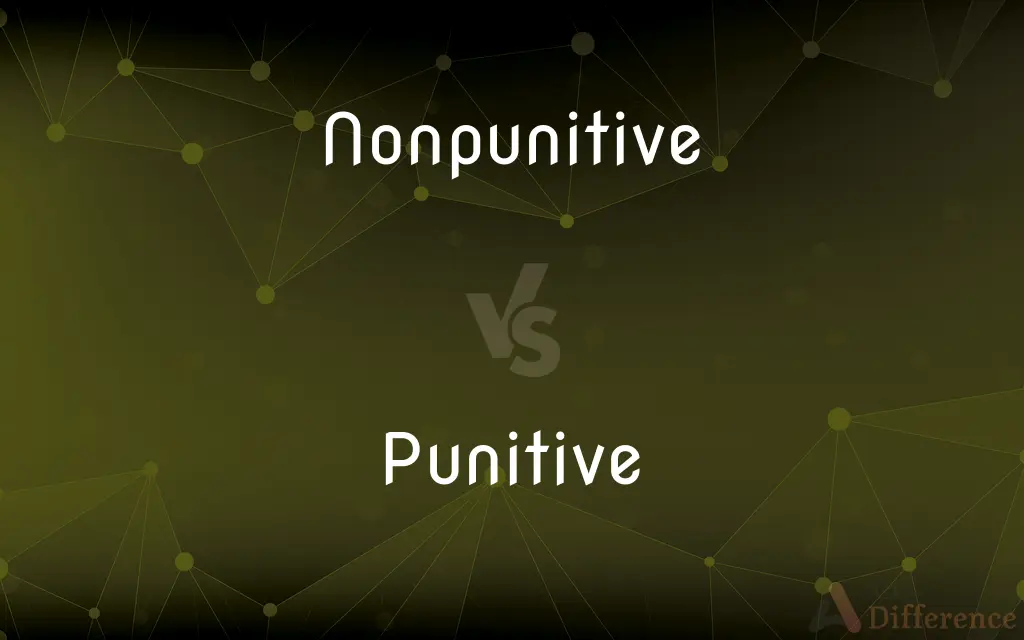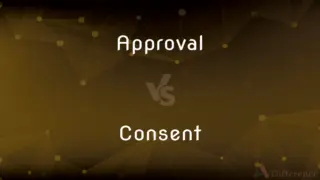Nonpunitive vs. Punitive — What's the Difference?
Edited by Tayyaba Rehman — By Urooj Arif — Updated on April 25, 2024
Nonpunitive measures focus on corrective action without punishment, whereas punitive measures involve penalties to enforce discipline.

Difference Between Nonpunitive and Punitive
Table of Contents
ADVERTISEMENT
Key Differences
Nonpunitive approaches aim to correct behavior through education and rehabilitation, emphasizing learning and growth. On the other hand, punitive measures are designed to impose consequences, such as fines or imprisonment, to deter negative behaviors.
Nonpunitive strategies are often used in environments like schools and workplaces to foster a supportive atmosphere. Whereas punitive actions are typically found in legal systems, where deterrence and retribution are key objectives.
Nonpunitive methods can include feedback, mediation, and conflict resolution techniques, which help in maintaining relationships. Conversely, punitive methods might involve suspension, termination, or legal penalties, which can sever relationships.
The effectiveness of nonpunitive measures often relies on the willingness of individuals to engage and improve. On the other hand, the success of punitive measures does not depend on the individual's acceptance but on the fear of consequences.
Nonpunitive practices are generally viewed as more progressive and are gaining popularity in modern management and educational theories. In contrast, punitive practices are traditional and deeply entrenched in many legal and organizational structures.
ADVERTISEMENT
Comparison Chart
Purpose
To educate and rehabilitate
To deter and penalize
Environment Usage
Schools, workplaces
Legal systems, strict policies
Methods
Feedback, mediation
Fines, imprisonment
Relationship Impact
Maintains and improves relationships
Can sever relationships
Dependence on Individual
High (needs engagement)
Low (independent of cooperation)
Compare with Definitions
Nonpunitive
Not involving or using punishment.
The teacher's nonpunitive approach helped students learn from their mistakes.
Punitive
Inflicting or aiming to inflict punishment.
Punitive laws are designed to deter crimes through harsh penalties.
Nonpunitive
Intended to reform or correct without penalizing.
Nonpunitive measures at work include training sessions to improve skills.
Punitive
Intended to enforce rules by penalties.
Punitive measures in schools can include suspension for serious infractions.
Nonpunitive
Emphasizing restoration over retribution.
In conflict resolution, a nonpunitive method is often more effective.
Punitive
Reflecting an approach focused on discipline.
His punitive approach to management created a fearful workplace environment.
Nonpunitive
Focused on improvement and positive reinforcement.
Nonpunitive parenting involves using rewards instead of punishments.
Punitive
Harsh and penalizing in nature.
The judge's punitive sentence reflected the severity of the offense.
Nonpunitive
Lacking a punitive component in its structure.
The new policy is nonpunitive and aims to support rather than punish.
Punitive
Related to or considered as punishment.
Punitive damages are awarded to deter similar future conduct.
Nonpunitive
Not punitive.
Punitive
Inflicting or intended as punishment
He called for punitive measures against the Eastern bloc
Punitive
Inflicting or aiming to inflict punishment; punishing.
Punitive
Inflicting punishment; punishing.
Washington imposed punitive sanctions on Syria.
The jury awarded $10,000 in punitive damages.
Punitive
Of or pertaining to punishment; involving, awarding, or inflicting punishment; as, punitive law or justice.
If death be punitive, so, likewise, is the necessity imposed upon man of toiling for his subsistence.
We shall dread a blow from the punitive hand.
Punitive
Inflicting punishment;
Punitive justice
Punitive damages
Common Curiosities
What is a nonpunitive response to mistakes at work?
A nonpunitive response involves using mistakes as learning opportunities rather than grounds for punishment.
How do nonpunitive practices affect workplace culture?
They generally contribute to a more positive and collaborative workplace culture, encouraging open communication and trust.
Can nonpunitive measures be effective in serious offenses?
Nonpunitive measures can be effective if combined with support systems and rehabilitation, depending on the context and severity.
What are the legal bases for punitive actions?
Legal bases include laws and regulations that prescribe specific penalties for specific offenses to maintain order and safety.
What psychological effects do punitive measures have on individuals?
They can lead to fear, resentment, and sometimes a repeat of negative behaviors in a defiant response to authority.
Can nonpunitive measures lead to repeated offenses?
Without adequate support and follow-up, nonpunitive measures may not deter individuals from repeating offenses.
How do punitive measures function as a deterrent?
Punitive measures function by instilling fear of consequences, thereby deterring people from committing undesirable actions.
How do schools implement nonpunitive measures?
Schools implement nonpunitive measures by using restorative justice practices, counseling, and conflict resolution education.
What is the impact of punitive policies on recidivism?
Punitive policies can sometimes lead to higher recidivism rates if not paired with rehabilitative efforts.
Is a nonpunitive approach always preferable?
It depends on the situation; nonpunitive approaches are preferable in fostering long-term behavioral change but may not be sufficient in all cases.
Are punitive measures more costly than nonpunitive ones?
Punitive measures can be more costly due to enforcement and management of penalties, whereas nonpunitive measures focus on preventive care.
How do societal views on punishment affect the use of punitive measures?
Societal views can dictate the acceptance and enforcement of punitive measures; more conservative views typically favor stronger punitive actions.
What role do punitive damages play in civil lawsuits?
Punitive damages are intended to punish the defendant for particularly harmful behavior and to deter others from similar acts.
Are there any countries that favor nonpunitive methods over punitive ones?
Countries like Norway and Sweden are known for their progressive, nonpunitive correctional systems.
What are the benefits of nonpunitive measures in parenting?
Nonpunitive parenting helps build trust and effective communication, fostering a supportive relationship between parent and child.
Share Your Discovery

Previous Comparison
Approval vs. Consent
Next Comparison
Guy vs. GuysAuthor Spotlight
Written by
Urooj ArifUrooj is a skilled content writer at Ask Difference, known for her exceptional ability to simplify complex topics into engaging and informative content. With a passion for research and a flair for clear, concise writing, she consistently delivers articles that resonate with our diverse audience.
Edited by
Tayyaba RehmanTayyaba Rehman is a distinguished writer, currently serving as a primary contributor to askdifference.com. As a researcher in semantics and etymology, Tayyaba's passion for the complexity of languages and their distinctions has found a perfect home on the platform. Tayyaba delves into the intricacies of language, distinguishing between commonly confused words and phrases, thereby providing clarity for readers worldwide.














































